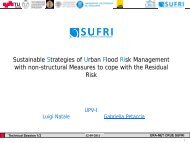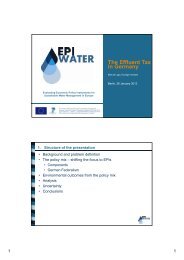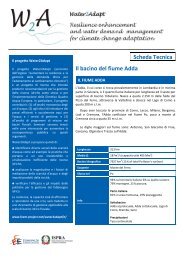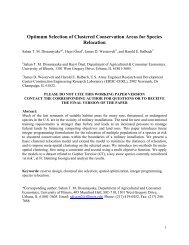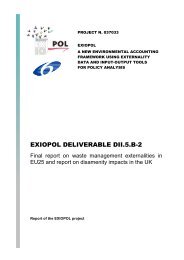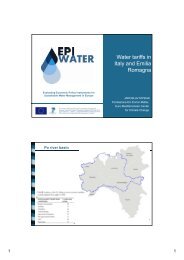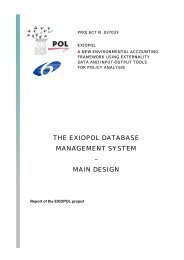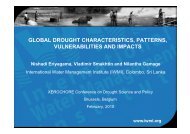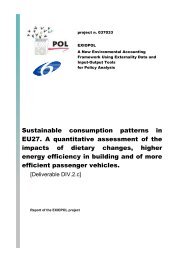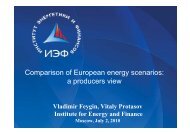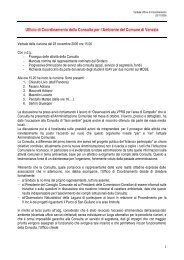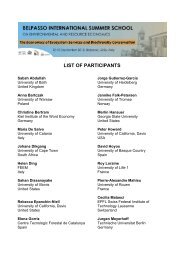Gulf and European Energy Supply Security - Feem-project.net
Gulf and European Energy Supply Security - Feem-project.net
Gulf and European Energy Supply Security - Feem-project.net
Create successful ePaper yourself
Turn your PDF publications into a flip-book with our unique Google optimized e-Paper software.
(Parliament) which favors the use of gas exclusively<br />
for domestic consumption. While the government<br />
authorities officially favor export <strong>project</strong>s <strong>and</strong><br />
ostensibly promote them, in fact the only operational<br />
export <strong>project</strong> is the pipeline to Turkey, which has<br />
witnessed throughput shortfalls in winter, when gas<br />
is required by the domestic Iranian market.<br />
On the foreign relations side, Iran is in a difficult<br />
situation because of the nuclear issue. The enrichment<br />
of uranium <strong>and</strong> its potential military use are posing a<br />
great obstacle for Iran in the international arena. The<br />
hardline leadership of the country shows little signs<br />
that its position concerning the dossier will change<br />
in the near future, <strong>and</strong> a hypothetical invasion by<br />
foreign troops would be the worst case scenario<br />
concerning gas infrastructure. Consequently, Iran is<br />
not officially considered by the EU as a c<strong>and</strong>idate for<br />
filling up Nabucco.<br />
To sum up, both Iran <strong>and</strong> Iraq are places<br />
where investments in the energy sector, <strong>and</strong> gas<br />
in particular, seem currently difficult; but the<br />
geographical positions of those two countries,<br />
which share a border with Turkey, <strong>and</strong> their very<br />
large resources, place them in a “hardly avoidable<br />
category” as future suppliers of gas to the EU. There<br />
is no easy solution to this dilemma, but if <strong>European</strong><br />
needs increase, <strong>and</strong> if a certain diversification is to<br />
happen, these two countries are likely to become<br />
necessary partners in a medium- to long-term<br />
perspective.<br />
Today, the only country in the region presenting<br />
stable political characteristics with low oil production<br />
<strong>and</strong> a small population is Qatar. Qatari production<br />
<strong>and</strong> exports keep increasing, <strong>and</strong> the OME predicts<br />
a marketed production as high as 200 bcm by 2020<br />
<strong>and</strong> 300 bcm by 2030. Qatar uses LNG as its export<br />
vehicle; this means that potential supplies to Europe<br />
would be in relatively high competition with Asian<br />
<strong>and</strong> North American dem<strong>and</strong>s due to the flexibility<br />
of LNG exports.<br />
Nevertheless, Europe is likely to remain the<br />
major importing market for natural gas in the world,<br />
which should attract the attention of producing<br />
countries. Moreover, Europe imports very limited<br />
amounts of Qatari gas for the time being (7.9 bcm<br />
in 2009, according to BP), which goes to Spain,<br />
Geopolitical Issues of Europe’s Future Gas <strong>Supply</strong><br />
Belgium, the UK <strong>and</strong> Italy. Qatar represents a<br />
very important opportunity for diversification of<br />
<strong>European</strong> gas supplies, <strong>and</strong> it presents very limited<br />
geopolitical risks. Even if competition is fierce, in<br />
absolute figures an important quantity of gas could<br />
be allocated to Europe <strong>and</strong> specifically to countries<br />
which still lack diversification possibilities (such as<br />
Pol<strong>and</strong>, which is expected to start importing from<br />
Qatar very soon, <strong>and</strong> Greece). Qatar is, therefore,<br />
considered a strategic future supplier of gas to the<br />
EU.<br />
4.the Increase of LnG trade<br />
Currently, LNG represents about 30 percent<br />
of total gas trade, but the proportion is likely to<br />
increase as LNG transportation costs decrease. The<br />
higher flexibility of gas shipments would have several<br />
impacts. It would, for example, allow the emergence<br />
of a more important spot market for gas. At present,<br />
only a few places play this role (mainly the Henry<br />
Hub in the US, the National Balancing Point in the<br />
UK, <strong>and</strong> Zeebrugge on continental Europe), but if<br />
the roles of the <strong>European</strong> hubs increase, they would<br />
acquire acceptance as price discovery tools. A gas<br />
spot market would probably augment the volatility<br />
of prices <strong>and</strong> could both reduce security of supply<br />
<strong>and</strong> play the role of an emergency tool.<br />
Gas prices are for the moment pegged to<br />
oil prices because gas contracts are bilateral<br />
<strong>and</strong> infrastructure is fixed, which makes gas an<br />
illiquid asset. However, Jonathan Stern (2007)<br />
has argued that the link between oil <strong>and</strong> gas is<br />
becoming less relevant because switching capacity<br />
in power generation facilities is increasingly being<br />
ab<strong>and</strong>oned. 23 Therefore, using oil to price gas is<br />
going to be more a matter of strategy <strong>and</strong> politics<br />
rather than a physical necessity.<br />
Facilitated competition for gas between various<br />
actors may be brought about by an increase of<br />
LNG trade involving Europe, North America <strong>and</strong><br />
East Asia. For example, Qatar will serve both the<br />
Atlantic basin <strong>and</strong> the Pacific basin, while Trinidad<br />
<strong>and</strong> Tobago will play the arbitrage between North<br />
America <strong>and</strong> Europe. Algeria <strong>and</strong> African exporters,<br />
primarily Nigeria, could also divert some of their<br />
exports to the US.



